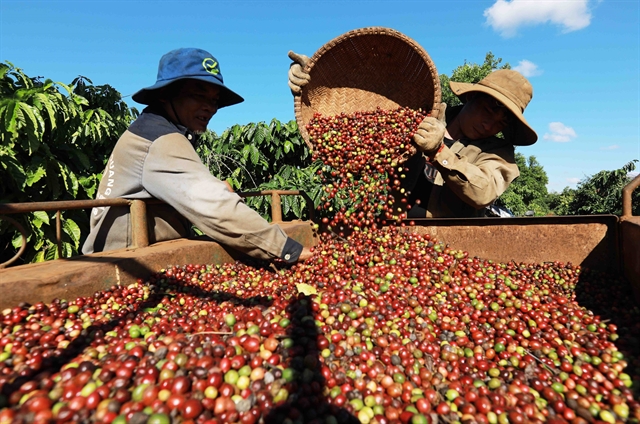 Economy
Economy

 |
| Farmers harvest coffee beans in Đắk Lắk Province. VNA/VNS Photo Vũ Sinh |
HÀ NỘI — Despite having a high export volume, Vietnamese coffee exporters are witnessing a drop in revenues owing to falling coffee prices.
The fall in prices could be attributed to the weakening demand of the global economy and the abundant supply of domestic coffee between 2022 and 2023.
Specifically, coffee in Lâm Đồng Province was traded at VNĐ38,600 (US$1.63) per kilo by late 2022, comparable to that in Đắk Lắk, Đắk Nông, or Gia Lai provinces, which was sold at around VNĐ39,200 per kilo.
Those prices were 22 per cent lower than the peak levels in August last year and 5.3 per cent lower than the figures in late 2021, effectively dragging down exporters' revenues.
Vietnam National Coffee Corporation (Vinacafe) posted revenue of VNĐ1.8 trillion ($76.4 million) last year in the wake of the price fall, down 10 per cent year-on-year, resulting in a loss of VNĐ19 billion.
Nguyễn Quốc An, head of Vinacafe's Import and Export Department, revealed that his corporation would take a cautious approach to its business this year to hedge against risks. As such, expanding market reach would no longer be its priority.
"In such a volatile market, we will shift our focus from boosting revenues to risk management to stay hedged against uncertainties," said An.
Domestic raw coffee prices were about 3 per cent lower than the prices that Vinacafe could realise from its export in late 2022. The company had to stop signing new exporting contracts to not incur higher losses.
The situation was not better for the Intimex Import - Export JSC, which saw its coffee export plunge in the last six months of 2022 amid fierce competition from Indonesian robusta.
Intimex Chairman Đỗ Hà Nam forecast that coffee exports between 2022 and 2023 would continue to drop further from the figures between 2021 and 2022.
However, he also held that Vietnamese coffee would probably stay ground internationally because of its low glyphosate residues, which has given it a competitive advantage over Brazilian robusta.
Thắng Lợi Coffee JSC is another company that has been financially hard-hit by the falling coffee prices. It made a profit of just VNĐ1.2 billion in 2022, down 28 per cent year-on-year.
The company said despite high sales during the year, the price fall eroded its profit margin by 3.3 percentage points. Meanwhile, its costs rose by 32.5 per cent to VNĐ451 billion, resulting in lower profits.
The Agency of Foreign Trade, under the Ministry of Industry and Trade, forecast that the situation would turn around by the end of Q1 as global coffee consumption is expected to pick up on the back of falling inflation worldwide, leading to the recovery of coffee prices.
World coffee prices have begun to rise by 12 per cent, to about $2,053 per tonne. Domestic robusta prices followed suit to be in line with the bullish trend, reaching around VNĐ42,800 per kilo in January and remaining stable in early February.
The US Department of Agriculture forecast that global coffee consumption between 2022 and 2023 would increase to 167.9 million bags.
However, the market would experience an excessive supply of 4.8 million bags during the period, resulting in a fall of three million bags in global exports. Countries expected to bear the brunt of the oversupply include Brazil, India and Việt Nam.
Meanwhile, the International Coffee Organisation estimated global coffee consumption at 170.3 million bags between 2022 and 2023, up 3.3 per cent year-on-year. The consumption figure is expected to surpass global coffee output by 3.1 million bags. — VNS




